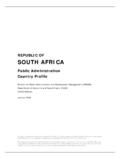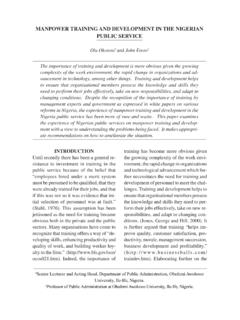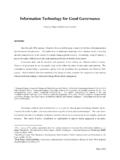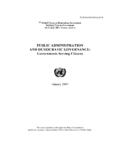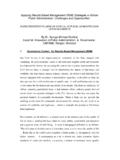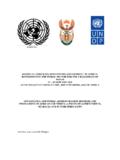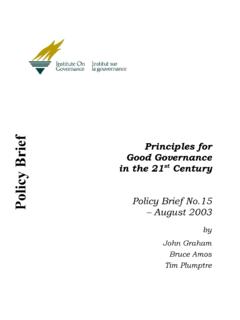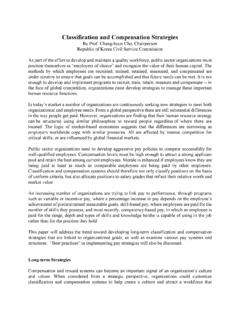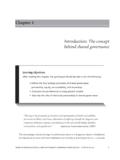Transcription of Role of Public Administration in the Management of ...
1 UNITED. NATIONS ST. Secretariat Distr. LIMITED. ST/ 28 June 1995. ENGLISH ONLY. TWELFTH MEETING OF EXPERTS ON THE. UNITED NATIONS PROGRAMME IN Public . Administration AND FINANCE. New York, 31 July-11 August 1995. ROLE OF Public Administration IN THE Management . OF DEVELOPMENT PROGRAMMES. CONTENTS. Paragraphs Page INTRODUCTION .. 1 - 6 2. I. PARTNERSHIP FOR DEVELOPMENT .. 7 - 19 3. II. CAPACITY-BUILDING .. 20 - 28 6. III. AID Management , COORDINATION AND ACCOUNTABILITY .. 29 - 47 9. IV. SUMMARY AND CONCLUSION .. 48 - 50 13. ST/ English Page 2. 95-19378 (E) 180795 /.. *9519378*. /.. ST/ English Page 3. INTRODUCTION. 1. When one speaks of a Government's development programme, one means its forward-looking plans for improving the social and economic well-being of the country and its people, particularly its plans for the next few years.
2 Development programmes differ from country to country. Commonly, they are multisectoral and require a wide array of institutions - Public , non-governmental and private - for their implementation; they address investment and infrastructural needs as well as more general issues of capacity-building and human resource development; they are articulated to provide for national, regional and local needs; they attempt to provide consistency and integration between various developmental initiatives; and they indicate the quantum and sources of funds to be used for the programme and the manner in which such funds are to be allocated to competing uses. 2. Sometimes a country's development programme is confused with its aid programme.
3 Aid, more properly referred to as "official development assistance", is a means of financing the development programme. However, in some countries, the aid programme is so large in relation to other sources (funding over 80 per cent of development expenditure in extreme cases) that the domestically funded expenditures can be overwhelmed by the donor-funded activities. In such cases, it is easy to see how the role of the donor may dominate that of the Government. Such domination has led to accusations of the following sort: that aid projects are chosen by the donor rather than the Government; that aid is used primarily for the benefit of the donor, with that of the host country a secondary issue; that aid is a means of increasing demand for resources supplied by the donor; and that the process of giving aid leaves the recipient in a passive role, in which building stronger national capacity will always be an elusive goal.
4 3. Given the above assumptions and growing doubts concerning the effectiveness of aid, an urgent need has emerged to review and amend the basic relationships operating in the field of managing development. An approach is needed that will increase the participation of nationals in all aspects of the aid process: both as managers and decision makers and as participants and beneficiaries; and which at the same time will meet donors' legitimate concerns for financial and performance accountability. Moreover, in many countries, efforts are needed to affirm governmental leadership and control over the development programme. 4. Clearly, the ideal is a host-country Government with adequate capacity in all aspects of managing development: macroeconomic planning, fiscal Management , /.
5 ST/ English Page 4. programme design, project execution, budgeting, financial control, review and evaluation, accountability reporting, and, in the substantive areas, specific technical know-how. However, in practice, countries vary greatly in their steering and implementation capacities. This has spawned an extensive literature describing implementation problems, often ascribing failures to various host-country shortcomings. 5. The extent of national capacity influences several aspects of managing development: the relative roles of donor and recipient; strategies designed to improve host-country capacity; and the possibilities for successful development. 6. The present paper examines the environment in which managing development takes place.
6 It does so with regard, first, to the need for partnership, secondly to capacity-building and, thirdly, to aid coordination, Management and accountability. A final section reviews current trends and attempts to anticipate future developments. I. PARTNERSHIP FOR DEVELOPMENT. 7. Partnership implies the idea of sharing - for instance, in economic or social relationships. We can think of partnership as a joint venture, in which each participant may have a different role and degree of participation, depending on the partnership agreement. In conversation, the phrase "an unequal partnership" is somewhat pejorative, reflecting adversely both on the weaker party and on the partnership itself.
7 On the other hand, "an effective partnership" implies a pooling of strengths to attain a common goal. 8. More can be achieved by cooperation than by individuals acting in isolation. The same principle applied to managing development could lead to better use of resources and greater well-being for the people of recipient countries. In managing development, the two major partners are the donor and the Government of the host country. However, many other partners may exist, including other official donors and lenders (in multidonor projects), commercial lenders, consultants, contractors, enterprises, community groups, non-government organizations and so on. A central challenge of managing development is to join together these numerous and often disparate parties into an effective partnership.
8 However, it is equally important to examine the key partnership between donor and host-country Government. 9. Within what we might call the traditional relationship between the Government and donors, each side is accused of failures. Donors are /.. ST/ English Page 5. characterized as paternalistic; activated by selfish, nationalistic motives;. competitive with one another; partial in their choice of suppliers;. authoritarian; unrealistic in their expectations of host-country resource contributions; demanding, even threatening when their national interests are at stake; arrogant in their low estimation of host-country capacity; insufficiently concerned with creating the capacity needed by the Government to play a larger role in managing development; and intent on maintaining a position of superiority.
9 10. On the other hand, recipient Governments are accused of, among other things, lack of capacity; inability to formulate proposals in a form suitable for donor requirements; inefficiency in coordinating participants and local inputs; slowness in issuing necessary approvals; unreliability in providing and accounting for funds; laxity in financial Management (or worse); poor liaison with donors; more interest in securing funding than in achieving the objectives for which funds are supplied; allocating those who have been trained abroad to jobs requiring unrelated skills; failing to provide counterpart staff for internationally recruited experts; and inadequate accountability.
10 11. It would be wrong to exaggerate the importance of such accusations and counter-accusations: many aid relationships are free of serious problems. Nevertheless, there is a growing feeling that the effectiveness of aid could be improved if a more meaningful partnership could be created between the two key parties. The concept of sustainability implies that the desired benefits from any intervention should extend over a period of years beyond the period of investment. However, it is well documented that many aid-funded projects produce substantial benefits only while the project is in place: the follow-through after external funding ends is often inadequate. This is a problem of sustainability.
